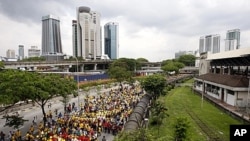Tens of thousands of people marched through the streets of the Malaysian capital, Kuala Lumpur, Saturday to protest what they say is an unfair electoral system. Riot police lashed out against the crowd to quell mounting discontent with the government ahead of the upcoming election.
Protestors gathered in Kuala Lumpur’s historic Merdeka, or Independence Square as Saturday’s rally quickly turned violent.
Malaysian riot police fired tear gas and a water cannon to control the crowds after they broke though barbed wire and barricades used to block off the square in anticipation of the protest.
The demonstrators say they are fed up with the government and its 2011 Peaceful Assembly Act - which limits where political rallies can be held. Saturday's demonstration is the largest Malaysia has seen in a decade.
Federal police in Malaysia estimated the protesting crowd number at 25,000 but several independent media outlets said the turnout was more than twice that.
One protestor seeking refuge after tear gas was sprayed in her eyes was candid about her thoughts on the current state of Malaysian politics. “This is a bitch [bad] government,” said the protestor.
Protestors are calling for changes to the country’s electoral laws, which they say will favor Prime Minister Najib Razak's long-ruling coalition in the upcoming elections.
The rally was organized by the opposition-backed group Bersih, or “Clean,” which staged a similar rally against electoral fraud in July last year.
Nurul Izzah, a member of parliament for a middle-class suburb in Kuala Lumpur who is also the daughter of opposition leader Anwar Ibrahim, cheered the protesters.
"So the turnout is a success. I am demanding that the home minister and the prime minister heed our calls for god's sake," said Izzah. "Lead the election role, replace the top lot of the Malaysian election commission with people whom Malaysians can trust. That's all we're asking. We're not asking to take over the country.''
With his popularity already on a steep decline, the violence could prompt Prime Minister Najib Razak to to delay elections that must be called by next March but could be held as early as this June.
Nahib’s popularity sunk after police employed heavy-handed tactics at the Bersih rally last July.
Police violence could alienate middle class voters, while further reform could anger conservatives in what is shaping up to be Malaysia’s tightest election.
Government opposition leader Anwar Ibrahim did not miss the chance to drum up support.
“So, the police caught on, to allow us to march, there are now five centers like this," he said. "So we have to converge. So immediately after prayers we will have to move, and we will see what happens. But it's very important that we have Malaysians from all communities, racial groups, converging together, demanding fair free elections, and stop the fraud."
Malaysia, a former British colony, is tightly controlled. The prime minister has made some reforms to the country’s tough security and media laws, and ended indefinite detention without trial, but it may be too little too late.
It is unclear whether initial changes to electoral laws will be in place for the next elections.
Young Malaysians are becoming increasingly politicized and the government’s 55-year grip on power appears under threat.
News
Malaysian Police Use Tear Gas, Water Cannon to Disperse Protesters
- By Kate Lamb





